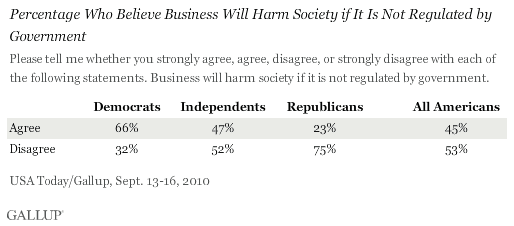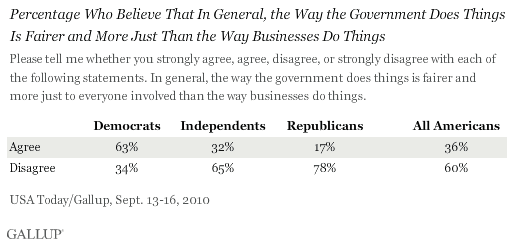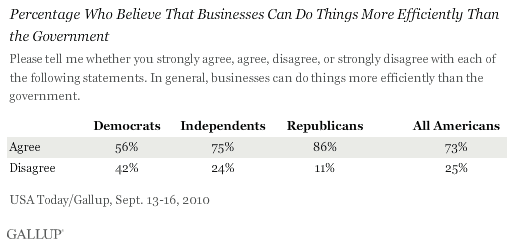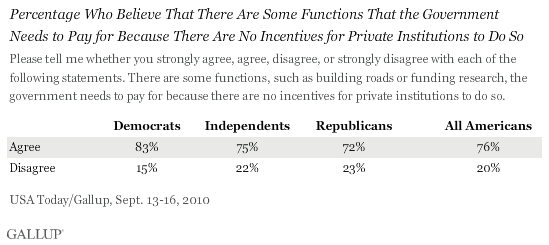PRINCETON, NJ -- Democrats and Republicans differ sharply over whether business will harm society if it is not regulated by government. Two in three Democrats believe business will do so, versus 23% of Republicans who say the same. Independents are split on the issue, as are Americans overall.

The Sept. 13-16, 2010, USA Today/Gallup poll asked Americans about other issues relating to the interplay of business and government, and found similar partisan splits on the issue of the relative fairness of government as opposed to that of business. While 63% of Democrats feel government is fairer and more just than business in the way it does things, 78% of Republicans hold the opposite view. In this instance, independents tend to side more with the Republicans.

Parties Agree That Business Is More Efficient Than Government
Although there are also partisan differences in views of the relative efficiency of business versus government, at least a majority of Democrats, independents, and Republicans agree that in general, businesses can do things more efficiently than government.

Similarly, more than 7 in 10 Americans across party lines believe there are some functions, such as building roads or funding research, that the government needs to pay for because there are no incentives for private institutions to do so.

Bottom Line
In recent months, many business leaders have voiced concerns that many in government are anti-business. Regardless of whether this is true, it appears that the large majority of Democrats -- the party currently in power -- believe business will actually do harm to society if it is not regulated by government, a viewpoint that perhaps reflects to some degree the fallout from the recession and financial debacle of the past several years.
Americans as a whole are split over their fear that business will do harm if not regulated, with 45% agreeing and 53% disagreeing. At the same time, 60% of Americans overall disagree with the idea that government is fairer and more just than business in the way it does things, compared with 36% who agree with this statement.
Most Americans also feel that businesses can do things more efficiently than government can. These views align with the recent rise in Americans' perceptions that the government has too much power.
Business leaders, however, might take some solace in the fact that just as many Americans see government as a threat (46%) as see business in that way (45%). These aspects of public opinion are vital to the ongoing debate over the best balance between business and government to create jobs.
Results for this USA Today/Gallup poll are based on telephone interviews conducted Sept. 13-16, 2010, with a random sample of 1,019 adults, aged 18 and older, living in the continental U.S., selected using random-digit-dial sampling.
For results based on the total sample of national adults, one can say with 95% confidence that the maximum margin of sampling error is ±4 percentage points.
Interviews are conducted with respondents on landline telephones (for respondents with a landline telephone) and cellular phones (for respondents who are cell phone-only). Each sample includes a minimum quota of 150 cell phone-only respondents and 850 landline respondents, with additional minimum quotas among landline respondents for gender within region. Landline respondents are chosen at random within each household on the basis of which member had the most recent birthday.
Samples are weighted by gender, age, race, education, region, and phone lines. Demographic weighting targets are based on the March 2009 Current Population Survey figures for the aged 18 and older non-institutionalized population living in continental U.S. telephone households. All reported margins of sampling error include the computed design effects for weighting and sample design.
In addition to sampling error, question wording and practical difficulties in conducting surveys can introduce error or bias into the findings of public opinion polls.
View methodology, full question results, and trend data.
For more details on Gallup's polling methodology, visit https://www.gallup.com/.
